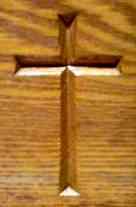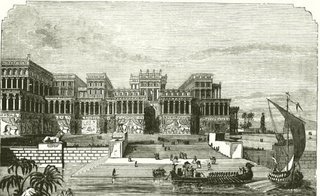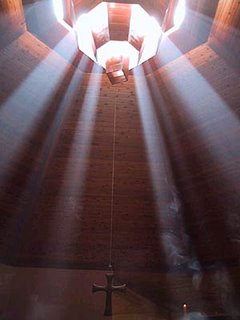Foolishness
Scriptures: 1 Corinthians 1:18-31
Jonah 2:1-9
Here's what you would expect: You would expect the creator of the universe to have some real power, some real heft. You would expect that the God who tore the oceans apart, who created the sun with a word, who brought life out of nothing, to be able to keep things under control.

And if that God ever came to earth, you would expect somebody powerful. An emperor--or at least a king--someone with some strength. Someone who could command powerful armies, get the world organized right, and then rule forever, or at least for many many years before leaving again, gracefully and mysteriously.
That's what you would expect. But that's not what we got.
In our lesson from Paul's letter to the Corinthians, Paul tells us about Jesus. The Jesus who was God among us -- humble, ordinary, but a teacher and a healer. The Jesus who died on a cross. What people expected, according to the wisdom of the world, was not what they got. Instead, we got God's Foolishness.
 You see, anymore you and I are used to seeing the cross. They're in this sanctuary, on top of every church, and I'm even wearing one around my neck as we speak. But the cross is not a pretty decoration. It's an ancient torture device. Can you imagine having electric chairs or nooses where we have crosses now? It's hard to even imagine. But for the early churches, that was the message. God's Foolishness, come to earth in a poor man from the back hills of nowhere, who collected a ragged following of nobodies, and then died an embarrassing death on the cross at the hands of the Roman Empire. God's Foolishness, transformed into the salvation of the world, the path to new life, the welcome back.
You see, anymore you and I are used to seeing the cross. They're in this sanctuary, on top of every church, and I'm even wearing one around my neck as we speak. But the cross is not a pretty decoration. It's an ancient torture device. Can you imagine having electric chairs or nooses where we have crosses now? It's hard to even imagine. But for the early churches, that was the message. God's Foolishness, come to earth in a poor man from the back hills of nowhere, who collected a ragged following of nobodies, and then died an embarrassing death on the cross at the hands of the Roman Empire. God's Foolishness, transformed into the salvation of the world, the path to new life, the welcome back.
Paul's point, of course, writing to a bunch of contentious church folks, is that what looks like wisdom to people is in fact totally ridiculous in God's eyes. What seems powerful to humans is in fact useless and futile.
Which brings us to our story from Jonah.
When we meet Jonah, he is in the belly of a big fish, which is swimming down deep to the bottom of the ocean. How did he get here, you might ask? Well, it all begins with the Ninevites.
Nineveh, in those days, was the capital of a huge empire. An empire that had conquered Israel on more than one occasion. And God was getting ready to do what they call some smiting. Nineveh was wicked, and God had had enough. It was time for punishment.

But first! But first--God wants to give Nineveh one more chance. One more chance to turn back, one more chance to change its ways. So God tells Jonah to go and preach to them. And Jonah hears God's message and promptly turns around and runs in the other direction. This is our first hint that the book of Jonah is satire. Most prophets object when God calls them--Jeremiah: "I'm too young." Isaiah: "I'm not holy enough." Moses: "I'm afraid of public speaking." But Jonah doesn't bother with formalities because what he objects to is God's Foolishness--God's crazy wish to save the Ninevites, even if they are enemies to both God and Israel. Jonah doesn't argue; he runs.
Jonah travels by foot to the Mediterranean, goes to the nearest port, and buys a ticket on a ship to go as far west as he can. But as soon as they're out to sea a couple of days, the water starts to churn and a terrible storm comes up. The sailors are a god-fearing lot, in the sense that they know a storm like this is the result of somebody's god being very, very angry. They draw straws to figure out who's the guilty party. Jonah's straw comes up short. He admits to being the problem. "Yep, it's my God who's mad. He's pretty powerful. I guess you better throw me overboard, then." The sailors hesitate to do this. But even with throwing all the extra cargo overboard, the ship is still in danger. So they chuck Jonah over the side of the ship.
churn and a terrible storm comes up. The sailors are a god-fearing lot, in the sense that they know a storm like this is the result of somebody's god being very, very angry. They draw straws to figure out who's the guilty party. Jonah's straw comes up short. He admits to being the problem. "Yep, it's my God who's mad. He's pretty powerful. I guess you better throw me overboard, then." The sailors hesitate to do this. But even with throwing all the extra cargo overboard, the ship is still in danger. So they chuck Jonah over the side of the ship.
The storm clears immediately. Jonah gets swallowed by a whale.
And this is the point in our story where we know for sure that the writer of Jonah is having a little fun with us. Because as the fish is swimming down, down, down, Jonah is praying up, up, up. As if he weren't in the strangest and most dangerous position. As if he weren't on the run from God.
The fish vomits Jonah up on the beach. He's alive, but slimy. Resigned to his fate, he goes to Ninevah. Ninevah is a huge city--it takes three days to walk all the way across it. Jonah does the absolute minimum of what he's been told. He walks in for one day, stops on the street corner, clears his throat, and utters one sentence: "Repent now, or else God will destroy you!"

One of the Ninevites hears him and tells somebody else, who tells somebody else, who tells somebody else, until the king of the whole city gets word and declares a citywide day of repentance. Everybody dresses in ugly, uncomfortable clothes--even the animals--and they sit around fasting and begging God to forgive them.
Which God does.
Which makes Jonah really mad.

Jonah's human wisdom was that a show of power was needed--maybe a hard flooding rain, or even some fire and brimstone out of the sky. But God's Foolishness, wiser than Jonah's wisdom, is to save the Ninevites, to give them a chance to repent, to reach out to them one last time.
Why does God do this? One simple reason: love. God loves those Ninevites. The men and women, the boys and the girls, and even the animals all dressed up in sackcloth and ashes. God loves them like crazy. Foolishly, even.
Maybe we're a little like the Ninevites. We've been working very hard at being God's enemy in one way or another--with self-destructive lives, with harm to our neighbors, with abuse of the nations outside our empire.
And maybe we're like those early Corinthian Christians--trying to win at impressing God, trying to outdo everybody else. Or maybe we're like those ragtag disciples--trying our hardest, but pretty sure we're not really good enough.

But God's Foolishness is like no human wisdom at all. We are loved, as we are, with no respect to how we look, our race or age, who we love, what our mistakes and missteps are. We are loved. And the cross is the reminder of that. The paradox of God's power, dwelling humbly among us in a way that human wisdom would never expect. God is crazy, foolish even, with love for us. I'll trade human wisdom for that any day. Amen.
Jonah 2:1-9
Here's what you would expect: You would expect the creator of the universe to have some real power, some real heft. You would expect that the God who tore the oceans apart, who created the sun with a word, who brought life out of nothing, to be able to keep things under control.

And if that God ever came to earth, you would expect somebody powerful. An emperor--or at least a king--someone with some strength. Someone who could command powerful armies, get the world organized right, and then rule forever, or at least for many many years before leaving again, gracefully and mysteriously.
That's what you would expect. But that's not what we got.
In our lesson from Paul's letter to the Corinthians, Paul tells us about Jesus. The Jesus who was God among us -- humble, ordinary, but a teacher and a healer. The Jesus who died on a cross. What people expected, according to the wisdom of the world, was not what they got. Instead, we got God's Foolishness.
 You see, anymore you and I are used to seeing the cross. They're in this sanctuary, on top of every church, and I'm even wearing one around my neck as we speak. But the cross is not a pretty decoration. It's an ancient torture device. Can you imagine having electric chairs or nooses where we have crosses now? It's hard to even imagine. But for the early churches, that was the message. God's Foolishness, come to earth in a poor man from the back hills of nowhere, who collected a ragged following of nobodies, and then died an embarrassing death on the cross at the hands of the Roman Empire. God's Foolishness, transformed into the salvation of the world, the path to new life, the welcome back.
You see, anymore you and I are used to seeing the cross. They're in this sanctuary, on top of every church, and I'm even wearing one around my neck as we speak. But the cross is not a pretty decoration. It's an ancient torture device. Can you imagine having electric chairs or nooses where we have crosses now? It's hard to even imagine. But for the early churches, that was the message. God's Foolishness, come to earth in a poor man from the back hills of nowhere, who collected a ragged following of nobodies, and then died an embarrassing death on the cross at the hands of the Roman Empire. God's Foolishness, transformed into the salvation of the world, the path to new life, the welcome back.Paul's point, of course, writing to a bunch of contentious church folks, is that what looks like wisdom to people is in fact totally ridiculous in God's eyes. What seems powerful to humans is in fact useless and futile.
Which brings us to our story from Jonah.
When we meet Jonah, he is in the belly of a big fish, which is swimming down deep to the bottom of the ocean. How did he get here, you might ask? Well, it all begins with the Ninevites.
Nineveh, in those days, was the capital of a huge empire. An empire that had conquered Israel on more than one occasion. And God was getting ready to do what they call some smiting. Nineveh was wicked, and God had had enough. It was time for punishment.

But first! But first--God wants to give Nineveh one more chance. One more chance to turn back, one more chance to change its ways. So God tells Jonah to go and preach to them. And Jonah hears God's message and promptly turns around and runs in the other direction. This is our first hint that the book of Jonah is satire. Most prophets object when God calls them--Jeremiah: "I'm too young." Isaiah: "I'm not holy enough." Moses: "I'm afraid of public speaking." But Jonah doesn't bother with formalities because what he objects to is God's Foolishness--God's crazy wish to save the Ninevites, even if they are enemies to both God and Israel. Jonah doesn't argue; he runs.
Jonah travels by foot to the Mediterranean, goes to the nearest port, and buys a ticket on a ship to go as far west as he can. But as soon as they're out to sea a couple of days, the water starts to
 churn and a terrible storm comes up. The sailors are a god-fearing lot, in the sense that they know a storm like this is the result of somebody's god being very, very angry. They draw straws to figure out who's the guilty party. Jonah's straw comes up short. He admits to being the problem. "Yep, it's my God who's mad. He's pretty powerful. I guess you better throw me overboard, then." The sailors hesitate to do this. But even with throwing all the extra cargo overboard, the ship is still in danger. So they chuck Jonah over the side of the ship.
churn and a terrible storm comes up. The sailors are a god-fearing lot, in the sense that they know a storm like this is the result of somebody's god being very, very angry. They draw straws to figure out who's the guilty party. Jonah's straw comes up short. He admits to being the problem. "Yep, it's my God who's mad. He's pretty powerful. I guess you better throw me overboard, then." The sailors hesitate to do this. But even with throwing all the extra cargo overboard, the ship is still in danger. So they chuck Jonah over the side of the ship.The storm clears immediately. Jonah gets swallowed by a whale.
And this is the point in our story where we know for sure that the writer of Jonah is having a little fun with us. Because as the fish is swimming down, down, down, Jonah is praying up, up, up. As if he weren't in the strangest and most dangerous position. As if he weren't on the run from God.
The fish vomits Jonah up on the beach. He's alive, but slimy. Resigned to his fate, he goes to Ninevah. Ninevah is a huge city--it takes three days to walk all the way across it. Jonah does the absolute minimum of what he's been told. He walks in for one day, stops on the street corner, clears his throat, and utters one sentence: "Repent now, or else God will destroy you!"

One of the Ninevites hears him and tells somebody else, who tells somebody else, who tells somebody else, until the king of the whole city gets word and declares a citywide day of repentance. Everybody dresses in ugly, uncomfortable clothes--even the animals--and they sit around fasting and begging God to forgive them.
Which God does.
Which makes Jonah really mad.

Jonah's human wisdom was that a show of power was needed--maybe a hard flooding rain, or even some fire and brimstone out of the sky. But God's Foolishness, wiser than Jonah's wisdom, is to save the Ninevites, to give them a chance to repent, to reach out to them one last time.
Why does God do this? One simple reason: love. God loves those Ninevites. The men and women, the boys and the girls, and even the animals all dressed up in sackcloth and ashes. God loves them like crazy. Foolishly, even.
Maybe we're a little like the Ninevites. We've been working very hard at being God's enemy in one way or another--with self-destructive lives, with harm to our neighbors, with abuse of the nations outside our empire.
And maybe we're like those early Corinthian Christians--trying to win at impressing God, trying to outdo everybody else. Or maybe we're like those ragtag disciples--trying our hardest, but pretty sure we're not really good enough.

But God's Foolishness is like no human wisdom at all. We are loved, as we are, with no respect to how we look, our race or age, who we love, what our mistakes and missteps are. We are loved. And the cross is the reminder of that. The paradox of God's power, dwelling humbly among us in a way that human wisdom would never expect. God is crazy, foolish even, with love for us. I'll trade human wisdom for that any day. Amen.

0 Comments:
Post a Comment
<< Home